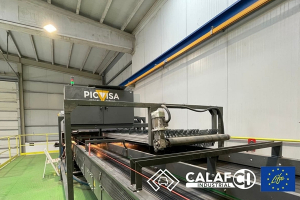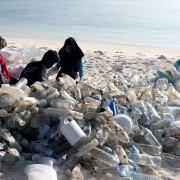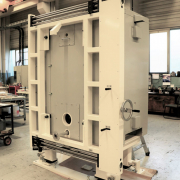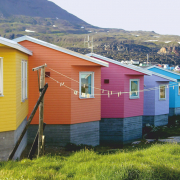LIFE PST SORT: Innovating Solution for the Material Recovery from End-of-life Vehicle (ELV) Shredding Residues
The LIFE PST SORT project is being successfully developed and is currently entering its third demonstration stage of recyclable waste recovering from ELV shredding rejects, which otherwise would have been sent directly to landfill or incineration.
Expressions of interest can be sent in writing to CALAF – PICVISA (www.picvisa.com) or via the project website: http://lifepstsort.eu/en/. Metals, plastics, glass and rubber are recovered from ELV shredder rejects at the demo plant, as well as solid recovered fuel (SRF) streams containing polyurethane foams, wood, paper and cardboard, and textiles are purified. In addition, recyclable materials can be recovered from WEEE, incineration slags, municipal and industrial waste.
Concerned stakeholders of the LIFE PST SORT project are recyclers, shredding plant operators of ELVs, waste management companies, local authorities and research centres. All of them can benefit from the demo plant and test centre located in Calaf, Barcelona (Spain).
The demonstration plant is fully automated, has a capacity of 6 to 8 t/h, covers an area of 1,000 m2, and includes PICVISA’s optical and inductive sorting equipment. The main advantages of the LIFE PST-SORT solution lie on the high performance levels and its easy integration in ELV shredding and recycling plants. Recyclables recovery of up to 66% (as a whole) have been measured. Besides, the modularity of the technological solution allows adaptations to almost any type of ELV shredding process, heavy and light fluff refuse treatment and waste recycling facilities, admitting changes of feedstock content and keeping high throughput levels. The material recovery process is automated, does not involve manual handling of waste and does not emit leachate.
The project runs from the end of 2018 to October 2021, and is granted by the European Union’s LIFE programme (No. LIFE17-ENV/ES/000168).
The LIFE PST SORT project takes place in a European industrial context that has not solved the recycling of materials that make up about a quarter of the weight of each vehicle. Some 40 million end-of-life vehicles (ELVs) are treated worldwide each year, with an average weight of 1.05 tonnes per vehicle, of which approximately 22% corresponds to after-shredding residues (ASR). In Europe, after the de-pollution and dismantling of end-of-life vehicles, 6 million vehicles are shredded per year. This represents 1,760,000 t/year of shredding rejects (ASR) which are usually sent to landfill or incinerated. 13% of Europe’s total ASR is produced in Spain.
CALAF – PICVISA has designed and built in Calaf (Barcelona, Spain) a demonstration plant for automated sorting of ELV residues. The plant covers an area of 1,000 m2 and is equipped with machine vision and artificial intelligence. The facility can treat between 22,000 and 35,000 tonnes of ASR per year, recovering two-thirds of the incoming stream, which would otherwise be almost entirely landfilled.
The solution proposed herein may also treat other industrial shredded materials, such as waste electrical and electronic equipment (WEEE) and glass (“glass cullet”), as well as a wide range of industrial and municipal solid waste.
The demonstration plant provides for waste sorting and recovery testing on an industrial scale, attracting the interest of recyclers, waste management companies, local authorities and research institutes. The project receives a grant from the European Union’s LIFE programme (No. LIFE17-ENV/ES/000168). The project is currently undergoing demonstrations with different feedstocks as well as technical, socio-economic and environmental evaluation works. In this last aspect, the LIFE PST-SORT solution is framed within the development of European Circular Economy infrastructures and provides sustainability increasing solutions to the automotive industry.
Source: Calaf industrial (Spain, April 15, 2021)








